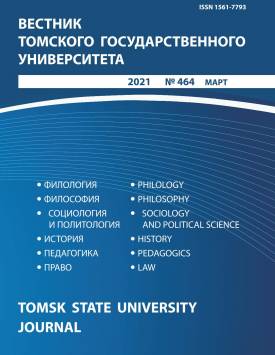Realization of the Concept Distance Learning in the Modern Russian Linguistic Culture
The article describes the concept distance learning which represents a certain fragment of the national world view typical of the native speakers of modern Russian. The study is based on the comparison of the interpretations of lexicographic data with the data obtained in the course of receptive and association experiments conducted with representatives of the modern Russian ethnic group. On the basis of the obtained linguistic material, the status of the studied concept in the minds of modern Russian speakers is determined and specified, its current semantic content is revealed. Besides, transformations that occur in its structure due to the influence of global extralinguistic factors are discovered. As a result of the research, the priority of conceptual cognitive features of the concept distance learning was established. Among the features of the concept that form its structure are characteristics indicating the possibility of receiving knowledge remotely, staying mainly at home as well as the need to develop students' personal qualities associated with the ability to work independently, self-control and time management. Application of a comprehensive methodology for studying the structure of the concept also made it possible to reveal the additional cognitive attributes of the studied concept that are not stated in modern lexicographic sources. The inclusion of two new groups of features in the conceptual structure - a promising and perspective form of education and training in a home setting accompanied by relaxing comfort and procrastination can be observed. The analysis of the collected actual language material allowed identifying cognitive characteristics of the evaluation component of the concept distance learning. It facilitated concluding that the cognitive features forming the structure of the concept under study are characterized by various features of antinomian nature. This fact can, presumably, be explained by the insufficient development and representation of the concept in the minds of modern Russian language speakers. It should be noted that, at present, the concept distance learning is perceived as a mental product that actualizes mainly negative reactions from the participants of the educational process. Interpretation of the data obtained during a series of psycholinguistic experiments also allowed studying and comparing the content of the concept distance learning represented in the minds of Russian native speakers of different age groups. It can be concluded that the ideas implied in the concept under study are varied. The greatest variety of definitions of the concept name, as well as the actualization of numerous and versatile evaluative features, was revealed mainly in the younger age group. This fact can be explained by the greater involvement of its representatives in distance education.
Keywords
cognitive linguistics, concept, Russian linguistic culture, receptive experiment, association experimentAuthors
| Name | Organization | |
| Abdrashitova Maria O. | Higher School of Economics | mabdrashitova@hse.ru |
| Bogdanova Anna G. | Tomsk State Pedagogical University | bogdanovaag@tspu.edu.ru |
References

Realization of the Concept Distance Learning in the Modern Russian Linguistic Culture | Vestnik Tomskogo gosudarstvennogo universiteta – Tomsk State University Journal. 2021. № 464. DOI: 10.17223/15617793/464/1
